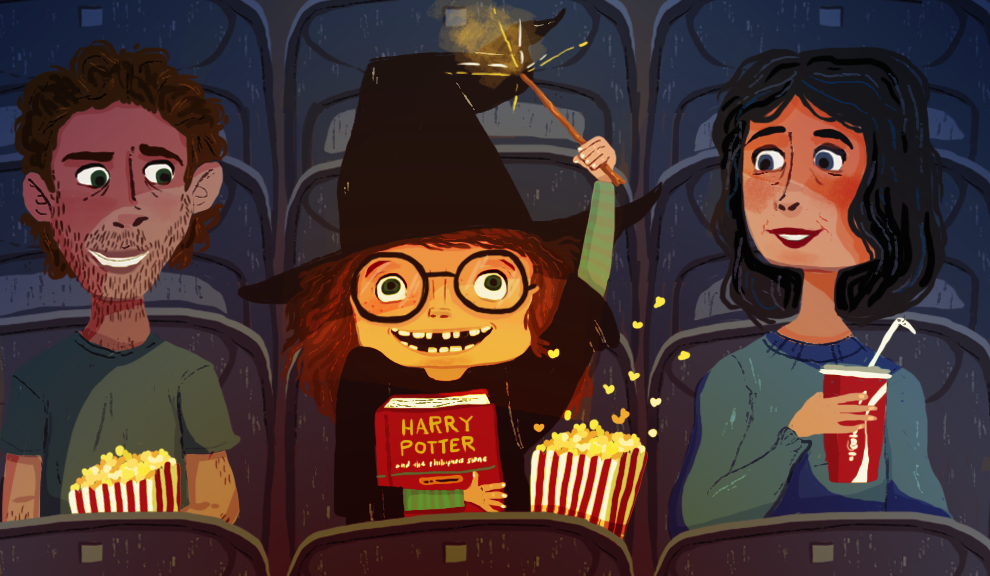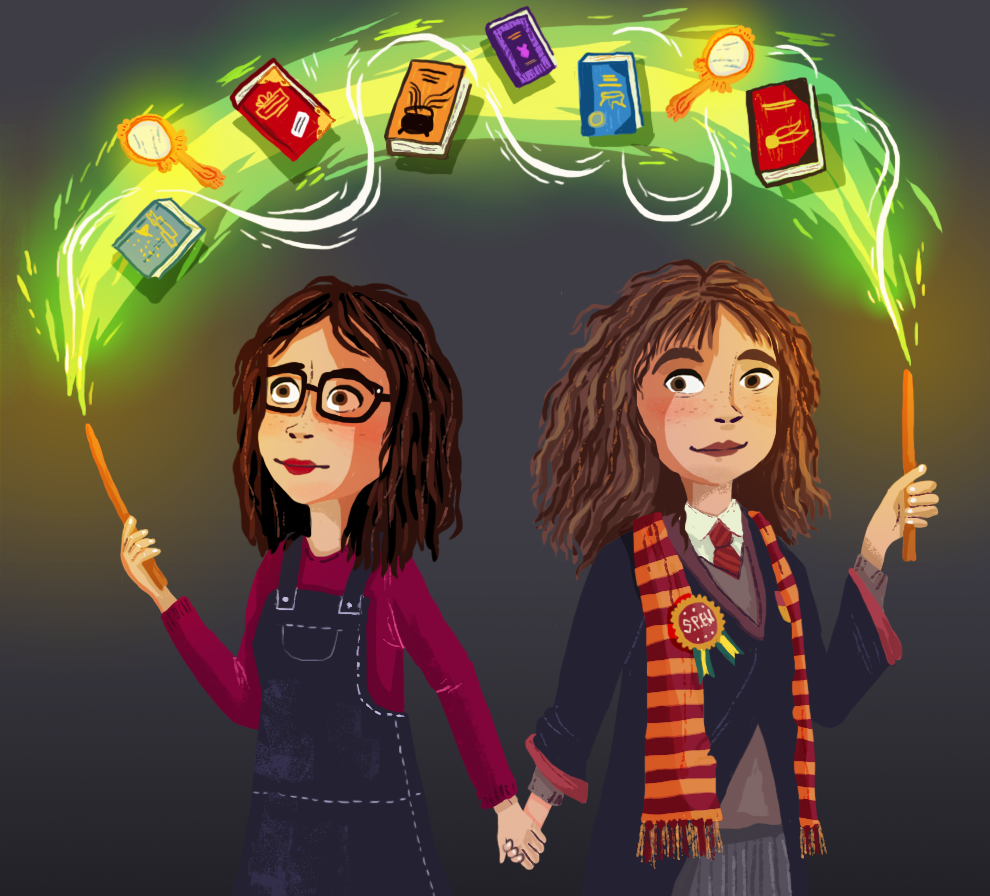
I was 5 years old the first time I met Hermione Granger. In 2001, I, along with the rest of the world, was eagerly anticipating the release of the first Harry Potter film. I must have read the first book already, because I clearly remember obsessively collecting any relevant newspaper clipping or magazine article that crossed my path. I coveted any and all merchandise sold to publicise the film’s release. I remember, when it came out, sitting in a dark cinema with my aunt and uncle, craning our necks because (presumably, as no adult would be so stupid) I had insisted that we sit in the front row. I have, for these reasons, always said that I began loving Harry Potter at age 5. Truthfully, though, I have no recollection of the first time that first line was read to me. Truthfully, those books and their characters have been a constant in my life ever since I can remember.
I was an only child: an island, albeit an island quietly content with my lot. I preferred to sit in solitary corners, reading books of rapidly increasing complexity, rather than run around with my peers and risk grazing a knee or – god forbid – breaking a sweat.
Like so many girls my age, I found myself in Hermione Granger. Even at 5 I was a bookworm, a tiny baby-nerd whose growth into a fully fledged know-it-all was inevitable. I was, of course, far from the first person to latch on to the only female lead in the most popular book series on the planet. I don’t claim to be special among the thousands of girls who idolised her, who crimped their hair and waved plastic wands when Halloween rolled around in an attempt to emulate their hero. Maybe you, dear reader, were one of those girls. But I was 5, and I didn’t know you then (unless I did, in which case – small world, huh?), and anyway, that’s the thing about books: As soon as they are opened, their world and their characters exist entirely for their reader.
It took me years to come up with the perfect term to define my relationship with Hermione. It couldn’t be friendship, because she was slightly too far out of reach: She was older and smarter, and already had friends whose adventures I could only observe, in awe, from a distance. Role model didn’t seem right either. I felt a role model had to be someone established in their wisdom and ready to lead. Albus Dumbledore was a role model (an incredibly flawed one, maybe – but that’s a different essay). Hermione was just a girl trying to navigate adolescence and save the world. And I could relate, at least, to the former.
Advertisement

It wasn’t until recently that I realised what Hermione had been to me. I both recognised myself in her and aspired to be more like her; I don’t know now, at 21, whether I love her so much because I am so much like her, or if I am so much like her because I have loved her so much. I studied her movements as she navigated ages 11 to 17, and as a result, she unwittingly guided me through the triumphs and troubles of girlhood. I envied her successes and learned from her mistakes. Hermione Granger had become the big sister I never had.
In hindsight, it’s astonishing (and very Hermione-esque) how much guidance I found in the limited information I was given. There’s no denying – as much as I wish Hermione Granger and the Brutal Destruction of the Patriarchy was a thing – that the protagonist of the Harry Potter series is, in fact, Harry Potter.
Regardless, though, I managed it. I took cues from the girl who found herself thrust into completely unfamiliar territory and studied my way out of any difficult situation I found myself in. I learned that it’s okay to cry when friends suddenly start walking past you in the corridors at school and acting as though you’re a stranger. I realised that even if I spent hours in the library, was petrified by a gigantic snake, and solved a centuries-old mystery, a boy would probably get all the credit anyway. And I taught myself to execute the perfect winged liner, because I learned that brains and beauty are not mutually exclusive and that if you want to let loose and dance at the Yule Ball with an internationally renowned Quidditch player then goddammit, you go, girl.

My granddad died almost exactly a year after the final book came out and almost exactly a month before my 14th birthday. He had spent the majority of his life working as the headmaster of a local high school, but retired almost immediately after I was born, therefore spending the majority of my life simply as my Nandad: white-haired and blue-eyed and – in my young mind – full of a world of wisdom. Early on in my obsession, when I was too young to read Harry Potter alone, he read the books aloud to me, his slightly softened Cornish accent intensifying tenfold upon any encounter with the character of Hagrid. He never could correctly pronounce “Hermione”, and I always laughed when he tried.
He died on a Saturday and my small family spent it, as English as ever, knocking back innumerable cups of tea in my grandmother’s small, stuffy living room. That night I went home and picked up Half-Blood Prince and read and read until my head was filled with thoughts of nothing else. I finally drifted into sleep.
The funeral was held a few days later in the small church still frequented by my grandmother. When it was over, exhausted and with dried teardrops on my glasses rendering them almost impossible to see through, I turned again to Half-Blood Prince. I read as Hermione, Harry, and Ron mourned their own white-haired, blue-eyed headmaster and, for the millionth time, was carried through my hardship by characters who had come to feel like family.

Though she helped me through my teen troubles from a distance (and through rereads), Hermione had, for all intents and purposes, left me alone at age 13. The last book came out just a week after my 13th birthday, and I lived through my adolescence without a word from Hermione. A lot of things happened in those almost nine years: I lost friends and made friends and lost friends again, left school and graduated from university, experienced my first relationship and my first breakup, moved to the capital city, and started my first real job. It wasn’t until almost a decade later – aged almost 22, worlds away from that 13-year-old – that I saw her again. It was 6 June, and the opening night of Harry Potter and the Cursed Child.
I can only describe walking into that theatre as like seeing an estranged friend or relative after years of limited and unsatisfying communication. I was both excited and anxious; after all, neither of us were teenagers any more. What if we’d grown apart? What if we were just different people?
Thankfully, my anxiety was misplaced. The Hermione of Cursed Child was everything I could have wanted. She was a leader; she was a lover; she was a rebel. She was living proof that life does not offer one path, and one destiny, and one outcome, but hundreds of thousands of possibilities just waiting to be explored.
At 22, Hermione Granger showed me that I can be anything. She taught me not only that change is good, but also that a life without it is tedious and stale. She taught me to love fearlessly, even when it comes at a cost. She taught me that nothing is more important than friendship, and loyalty, and bravery, and happiness. And, 16 years after we met for the first time, she is still teaching me some of the most important lessons I will ever learn.
It’s been almost a decade since I last picked up a Harry Potter book for the first time, but I have continued to return to them when I feel sad or lonely or in need of guidance. It feels like falling into the comfortable embrace of my oldest friend. I have many favourite lines from throughout the series, but I always find myself back at that final chapter of Half-Blood Prince, reading Ron and Hermione’s words of assurance for Harry, and knowing that those words will always belong to me, too:
“We’ll be there. We’ll go with you, wherever you’re going.”


